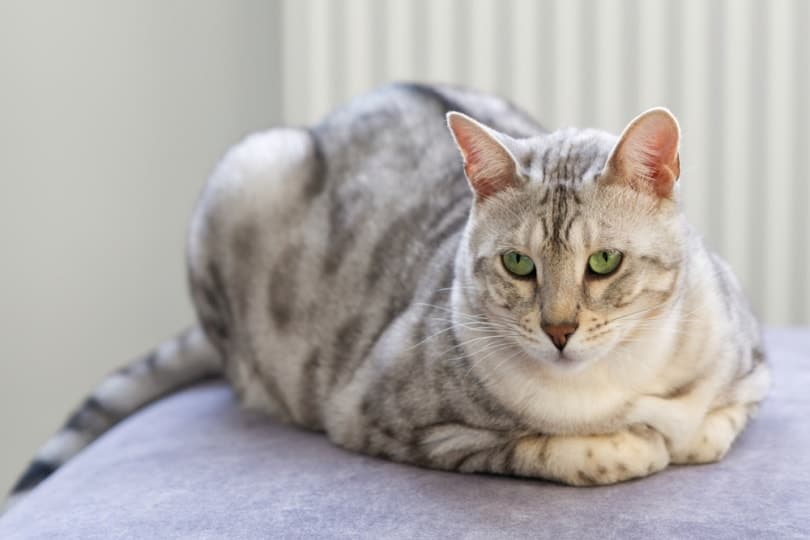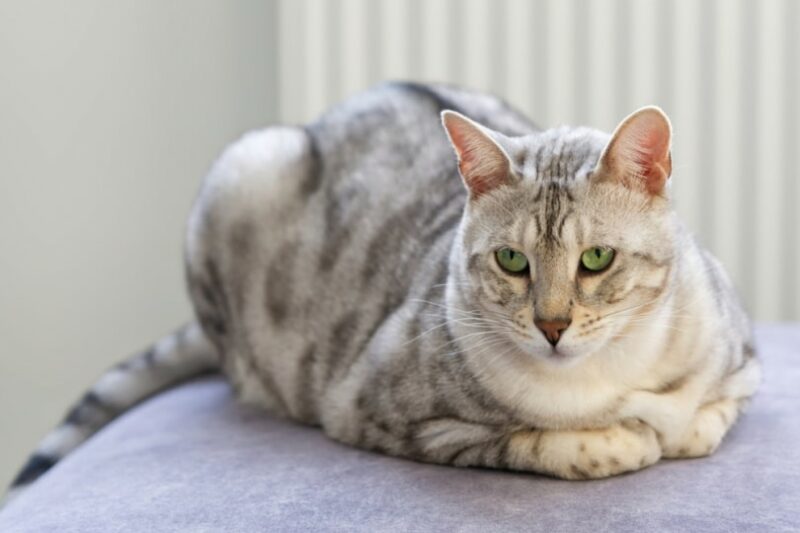Bengal cats are rare and only bred by specialty breeders. Therefore, not only is finding one quite difficult, but they can also be extremely expensive. You should be prepared to put a few thousand dollars down on this cat breed. Plus, that doesn’t include all of the equipment and lifetime costs of these cats. Luckily, they are quite healthy, so their vet bills are usually cheaper.
For a complete idea of how much these cats might cost, keep reading below.

Bengal Cat Price: Upfront Costs
These cats are typically quite expensive when it comes to purchasing one, at least. Because they are rare, you usually have to pay a pretty penny for a kitten. Finding them at adoption centers or shelters is nearly impossible.
Furthermore, because these cats are more active, you’ll need to pay more upfront for cat trees, toys, and similar equipment. Therefore, their upfront cost is high compared to other breeds. Be sure you can afford the equipment they need before deciding to adopt one.
Free
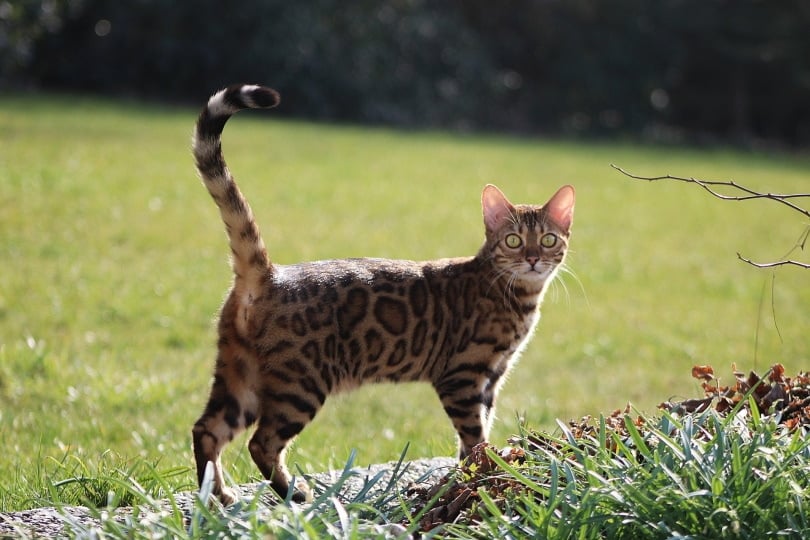
Because these cats are so rare and only owned by specialty breeders, they are rarely (read: never) available for free. If you find a Bengal kitten that is being given away for free, the odds of it actually being a purebred Bengal are quite low.
Even if someone adopted a Bengal kitten and then decided that they could not take care of it, many breeders have take-back programs and will take the kitten back. Therefore, these cats are not typically available for free. If someone gives a kitten away for free, they are likely going against their contract with the breeder.
Adoption
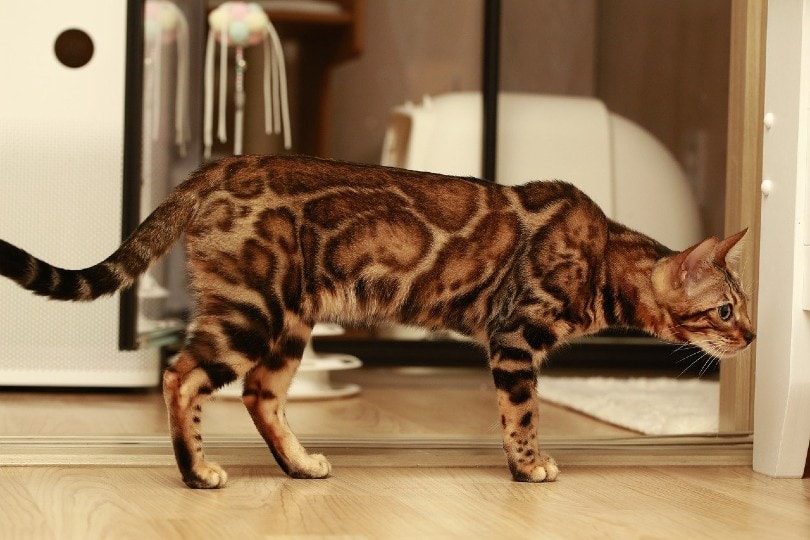
You usually can’t find these cats at adoption centers for the reasons stated above. Their breeding is not widespread. Instead, only a few breeders own most of the breeding cats. Most of their kittens are sold without breeding rights, which means that they are usually spayed or neutered. Therefore, there are not many accidental kittens out there, which are the ones that usually end up in adoption agencies.
Furthermore, many kittens are under contract with their original breeder. If the owner cannot take care of the cat for one reason or another, they are usually required to be returned from the breeder.
Breeder
- $1,500–$3,000
The average price for a Bengal cat is around $2,000. Breeding these cats is quite expensive, especially when it is done ethically. They are rare cats and often have a huge startup cost. Therefore, many of these costs get passed on to potential owners. Thousands of dollars for a cat might sound expensive, but the breeder is likely making very little money at this price.
There are many things that affect the price of a Bengal Cat from a breeder, including what is included with the kitten.
Initial Setup & Supplies
- $280+
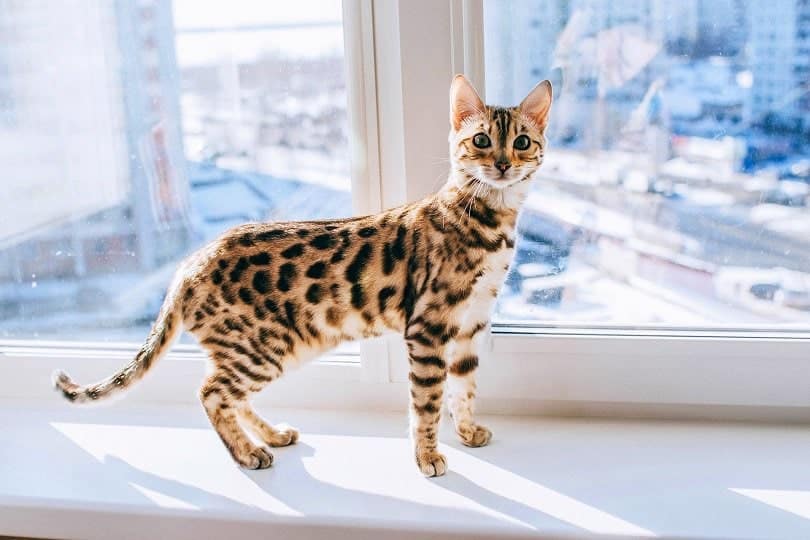
These cats are not inexpensive when it comes to equipment, either. Because they are more active than most cats, they tend to run through toys and climbing structures faster. They need lots of room to climb and jump, so cat furniture is a must for these felines. Plus, because many are required to be spayed or neutered upon purchase, you have to account for that surgery, as well.
Typically, it is your best bet to purchase higher quality cat equipment that is going to withstand these cats as opposed to saving money in the short run by purchasing less expensive options.
List of Bengal Care Supplies and Costs
| Pet Carrier: | $35 |
| Litter Box (large): | $22 |
| Cat Litter: | $20 |
| Dishes: | $9 |
| Scratching Post: | $50 |
| Cat Bed: | $20 |
| Cat Perch: | $75 |
| Toys: | $20 |
| Brush: | $7 |
| Various Cleaning Supplies: | $25 |
How Much Does a Bengal Cat Cost Per Month?
- $50–$100
For the most part, these cats are not more expensive per month than any other cat breed out there. If you purchased quality products when bringing your cat home, then they should last quite a while. Therefore, you will not need to worry about replacing your perch or scratching post for some time.
However, you will need to purchase food, litter, and other consumables. Luckily, these cats are not very expensive in this case, either.
Health Care
- $30–$380 per month
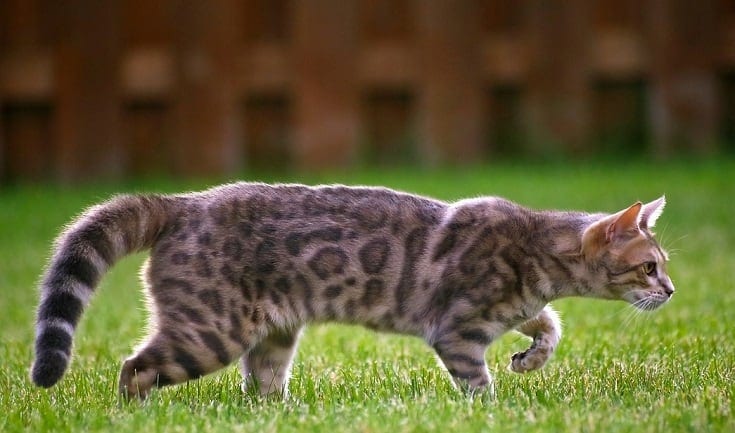
Bengal cats are pretty healthy, so they often don’t have many health care costs. You will need to pay for their regular vaccinations and parasite prevention. They will also need a regular veterinary visit about once a year.
Of course, if your cat does end up with health problems, these costs will be even higher. Some cats may need regular, monthly prescriptions for veterinary appointments. These can raise your cost substantially.
Food
- $30–$90 per month
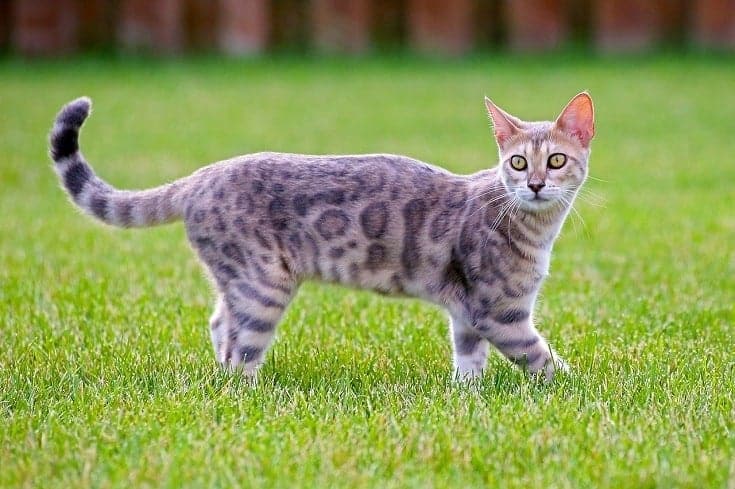
Every cat needs food, including your Bengal. They are larger, so they tend to eat a bit more than other cats. However, this doesn’t actually translate to much extra cost. (Not like it would in the food prices between a small dog and a large dog.)
The main price difference will depend on the quality of the food that you purchase. Premium options can be quite expensive, but they can also be better for your cat. Plus, keep in mind that better food may save you vet bills in the future.
Grooming
- $0 per month
Bengals will not need professional grooming. They are shorthaired cats that do not need their hair cut or trimmed. Therefore, you can typically get away with paying very little for their grooming. But you will still need to groom them at home regularly using a basic cat brush.
However, you shouldn’t have to pay anything monthly to groom your cat effectively. You’re mostly looking at a time commitment in this category.
Medications and Vet Visits
- $0–$200 per month
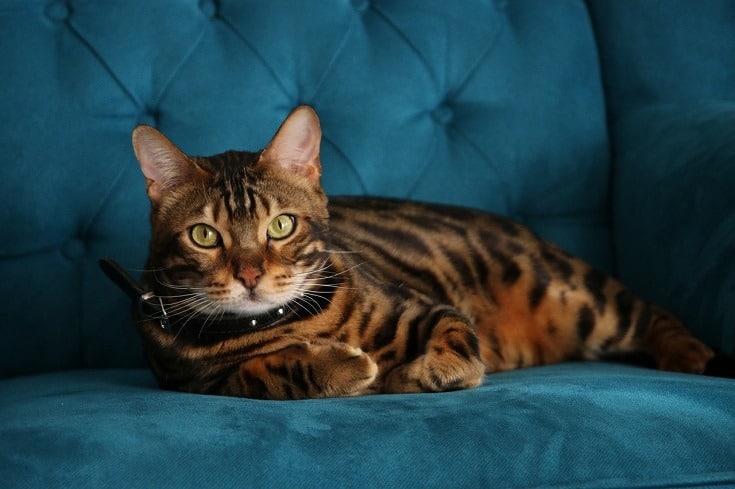
Bengal cats need regular vet visits, just like any cats. Preferably, your cat will only need a yearly checkup with booster vaccinations sprinkled in. In the end, this will cost very little each year. However, if your cat has a health problem, you can expect to pay more in this category.
Many cats are healthy when they are young. However, as they get older, they may require daily medications or more regular vet visits. Be prepared for these increased costs as they age.
Pet Insurance
- $5–$40 per month
You don’t have to purchase pet insurance. However, getting your cat insured helps pay for injuries and sicknesses that could cost thousands of dollars otherwise. Cat insurance varies widely in cost and coverage. Some very cheap plans only pay for certain injuries, for instance. For extensive coverage, you may spend as much as $40 a month.
Furthermore, the health and age of your cat also matter. In many cases, your insurance may start out relatively cheap. Then, it may increase as the cat ages. For this reason, you should expect prices to increase over the year.
Environment Maintenance
- $5–$30 per month
The main source of environmental maintenance for your Bengal will be their litter box. Because these cats are larger, they need a bigger litterbox, which also means more litter. Therefore, paying for upkeep may be a bit more expensive, as you’ll need to purchase more litter. But this isn’t usually significantly more expensive than other cats out there.
You’ll also need to regularly replace their scratching posts, as they have a high scratch need. Of course, this can be relatively expensive.
| Litter: | $10/month |
| Scratching Post Refill: | $5/month |
| Other Litterbox Needs: | $15/month |
Entertainment
- $30–$60 per month
Bengal cats are quite active, and you’ll need to spend a bit on cat toys to keep them happy. To keep them from becoming bored or possibly destructive, we recommend subscribing to a cat toy box or simply bringing home many different toys.
On top of your usual balls and mice, we recommend investing in puzzle toys as well. These toys help keep your cat entertained and are often necessary for these intelligent cats. These toys can be more expensive than your average toy, though.
Bengal Cat Cost: Total Monthly Spend For An Owner
- $50–$200+ per month
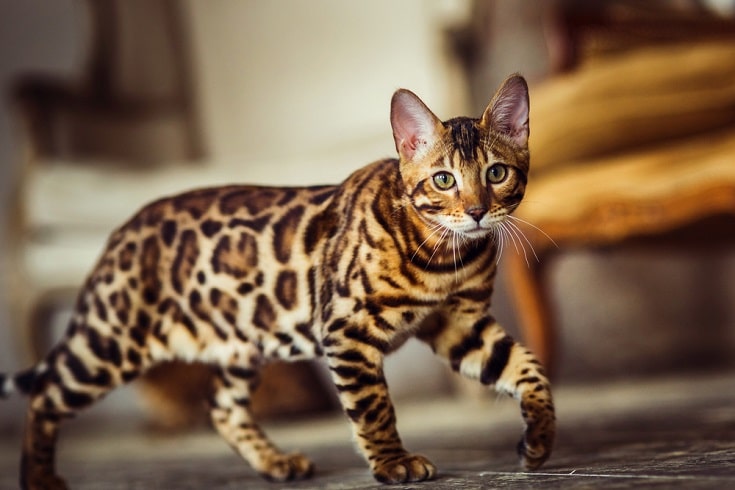
Owning a Bengal can get expensive, though it is usually comparable with owning any sort of cat. They may be larger, but their largeness usually doesn’t translate to very high costs—not as it does for dogs, at least. Your main costs will involve litterbox maintenance, food, and replacing scratching posts as necessary. Purchasing sisal to staple onto scratching posts is usually your cheapest option, though this can still get expensive.
Luckily, most Bengal cats are pretty cheap to take care of. Your cats may increase substantially if your cat has health problems, though.
Additional Costs to Factor In
While we’ve covered all of the usual costs, you’ll also need to keep in mind other costs that are common with cats. For instance, you may need someone to watch your Bengal when you go on vacation. Without pet insurance, emergency medical treatments can be expensive (and this can be the case even with insurance, in fact).
You typically don’t need to pay much to train a cat, but a Bengal can be different. They are quite intelligent, so you may want to invest more in training. Plus, this can make them a bit easier to control since they can be larger as well.
Bengals can be destructive in some situations. Therefore, you may find yourself spending money on repairs and similar costs. Bengals can do a number on carpets, for instance. Kittens tend to cause the most destruction since they are just now learning.
Owning a Bengal on a Budget
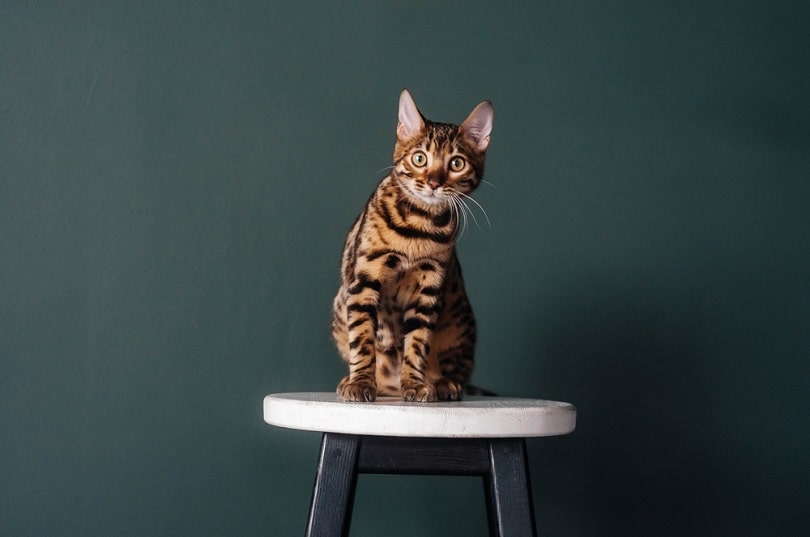
If you managed to purchase a Bengal, you likely don’t need to save much money on their care. However, there are still many ways to reduce your costs. One of them is to purchase pet insurance. While this may raise your monthly costs, it can potentially save you thousands in the future. Of course, the type you purchase does matter. In many cases, you’ll want to purchase something that will actually be used in the future and save you money (while not having terribly high monthly costs).
We do not recommend skimping on food or cat furniture for Bengals. They thrive on quality food and require plenty of scratching opportunities. Otherwise, you could be spending extra money on home repairs to purchase a new carpet or furniture.
Conclusion
Owning a Bengal can be quite expensive. Your upfront costs are going to be the biggest roadblock to owning one of these cats, as they can easily cost thousands of dollars upfront. Therefore, you’ll likely find yourself saving up quite a bit of money to purchase one of these cats.
Furthermore, they also need quite a bit of equipment, including cat trees and scratching posts. As intelligent, active cats, they need plenty of toys. We highly recommend investing in puzzle toys, though these can be more expensive upfront.
Luckily, these cats are pretty healthy, so you typically won’t need to pay large vet bills. However, that doesn’t mean that your cat won’t get sick. Health problems can occur and are rather expensive if they do.
Featured Image Credit: Velari Pavljuk, Shutterstock

